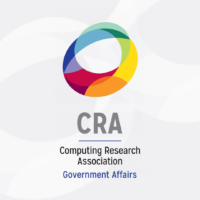CRA Statement Expressing Serious Concerns About Fiscal Year 2024 Funding Levels at the National Science Foundation and Other Key Federal Research Agencies
By Brian Mosley, Associate Director, Government Affairs
At the beginning of March, Congress passed, and President Biden signed into law, the Fiscal Year 2024 budgets for the National Science Foundation, the National Institute of Standards & Technology, the Department of Energy’s Office of Science, and NASA. Many of these budgets received funding cuts, some significant, compared to FY23 levels. CRA released the following statement expressing serious concerns about these funding levels:
CRA Statement Expressing Serious Concerns About Fiscal Year 2024 Funding Levels at the National Science Foundation and Other Key Federal Research Agencies
The Computing Research Association (CRA), representing more than 250 computing research organizations in academia and industry, has serious concerns about the significant cuts to Fiscal Year 2024 (FY24) funding levels that have been approved for key Federal research agencies, particularly the National Science Foundation (NSF). These cuts will have a significant impact on American leadership in key technologies. As the National Science Board’s recently released Science & Engineering Indicators note, the United States has lost significant ground in critical fields related to computing research, such as in artificial intelligence, where the People’s Republic of China has surpassed the US in research publications and patents and is educating more doctoral students in S&E fields.
This situation is only exacerbated by the FY24 appropriations process, where Congress approved an 8.5 percent cut to NSF, a reduction of $840 million in funding compared to FY23. Also cut were the National Institute of Standards and Technology (NIST) – reduced 10.4 percent or $170 million vs. FY23 – and the Department of Energy’s Advanced Scientific Computing Research (ASCR) program (4.7 percent cut, or $50 million). All three agencies are critical to maintaining U.S. leadership in cutting edge computing research, especially in areas of significant national interest like artificial intelligence, quantum computing, high-performance computing, and cyber security. Innovations in these areas are crucial to our national security and economic future.
These cuts will reduce the quantity of research, the number of researchers, and the number of students educated in key fundamental areas of computing and other fields of discovery at a time when global challenges demand that we increase all these measures. These cuts are occurring at the same time that the People’s Republic of China is increasing its investment in fundamental research.
We stand with the National Science Board in sounding the alarm as the country’s lead in several S&E metrics continues to degrade. For the United States to maintain its leadership in these and other S&E fields, we must follow through on the bipartisan promise of the CHIPS and Science Act, which recognized the need for broad investments in fundamental research to fuel innovation and discovery, and find supplemental support for these agencies. Failing to do so risks ceding valuable ground to our adversaries in these critical technologies, as well as the innovations that will lead to technologies not yet imagined.








